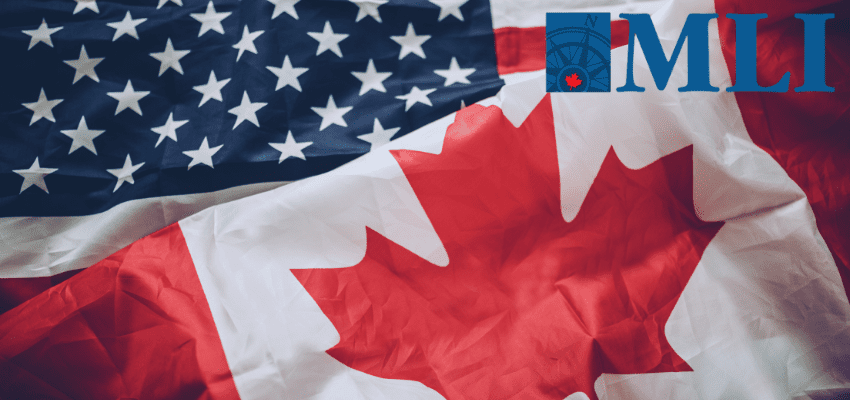This article originally appeared in the Hub.
By Trevor Tombe, November 14, 2024
Donald Trump’s presidential victory last week, and Republican control of the Senate and the House, mean significant U.S. tax changes are on the way.
This is not just because of Trump’s campaign commitments, but also because key elements of the previous tax reform—introduced in the first Trump administration in 2017—will soon expire.
The next Congress may act very quickly. Some key members are already exploring how to do this within the first 100 days.
Canada will need to respond. Our economies are too interconnected and capital too easily mobile. The total value of cross-border investment approaches $2 trillion, and a loss in tax competitiveness could mean a smaller Canadian economy, lower business investment, higher prices, and other ills.
We’ve seen this story before. Following the 2017 Tax Cuts and Jobs Act, the federal government responded with its own suite of measures that effectively lowered the tax rate on new investments. Canadian governments should prepare a bigger response for round two. Not just to maintain our relative position, but to improve upon it.
Trump’s tax measures
So what tax changes are in store?
It’s difficult to predict the exact details, which would be subject to the normal give-and-take of congressional lawmaking, but examining major provisions proposed by Trump during the campaign suggests a few likely priorities.
These include making the 2017 personal income tax changes permanent, allowing businesses to write off 100 percent of their investments, lowering the corporate tax rate to 15 percent, and exempting tips, overtime pay, and Social Security benefits from taxation, among other adjustments.
And while Trump was not explicit during the campaign, several advisors close to him have pushed for a plan to index capital gains to inflation—an idea the administration explored toward the end of Trump’s first term.
Indexing capital gains to inflation would address an issue in the tax system that recently high inflation made worse. If you bought stock in a company for $100 in 1990, and today it’s worth $200, it might seem like you’ve doubled your money. In nominal terms, you have. But the purchasing power of that $200 today isn’t significantly different from the $100 in 1990. Despite not really rising in value, we tax you as though it has.
Indexing capital gains for inflation would be relatively straightforward and would create a fairer tax structure that boosts the incentive to invest.
Next we have accelerated depreciation. Though wonky, this is a critical consideration for business investment. When a company makes an investment, it generally has to spread the cost over several years, with longer-lived investments taking even longer to be fully expensed. This delay in deducting investments from a company’s income for tax purposes effectively acts as a tax on the investment itself, reducing the immediate financial return.
Allowing businesses to write off the entire cost of their investments upfront would, in effect, eliminate this inefficient tax. Such a policy would encourage companies to invest more quickly in machinery, equipment, technology, and other assets, ultimately enhancing productivity and raising wages across the economy. Unfortunately, Canada is moving in the opposite direction, slowing the pace at which businesses can deduct these costs.
To boost economic growth, Canada should reverse course and implement immediate, full expensing for all capital investments as a permanent feature of the tax code.
Finally, there is the possibility of the U.S. lowering its overall corporate tax rate to 15 percent. This is already Canada’s federal rate, but we may still need to respond. Canadian provinces levy their own corporate taxes, and the overall tax on Canadian businesses is roughly 26 percent. Working with provinces to lower their corporate rates could be part of a broader New Deal for provinces that reforms federal-provincial transfers.
Ignore the bad ideas
To be clear, not all aspects of Trump’s tax plan should be adopted.
Some proposals are simply aimed at key voter bases in critical states. The commitments to make tips and Social Security payments tax-free, for example, are problematic. This is especially so in Canada, where tax-free pensions would worsen the already concerning (and widening) generational gap between old and young.
Trump has also proposed imposing 10-20 percent tariffs on all U.S. imports, with rates as high as 60 percent on imports from China. Such tariffs would undoubtedly harm Canada’s economy (though some argue a worst-case scenario is unlikely), and we should not follow their protectionist route.
No need to wait
Even the pro-growth tax changes aren’t free, of course. But the financial consequences of them bite harder on the U.S. government than they do on Canada’s.
The U.S. federal deficit is extraordinarily large—several times that of Canada’s as a share of our economy. The overall U.S. debt trajectory is also unsustainable. The major U.S. tax changes may cost $3 trillion over the next ten years. This will weaken their already worrying fiscal situation. But this is where Canada has an advantage, as federal finances are structurally sound over the long run despite the current deficit. We have the space to respond with tax changes of our own.
Whatever the U.S. does next, Canada need not wait to adopt good ideas. By taking the initiative now and preparing various federal and provincial budgets in the spring, we can boost economic strength and competitiveness even before the U.S. shifts its own.
Our weakening economy means the sooner we adopt pro-growth tax reforms, the better Trevor Tombe is a Senior Fellow at the Macdonald-Laurier Institute and Professor of Economics at the University of Calgary and the Director of Fiscal and Economic Policy at The School of Public Policy.
Trevor Tombe is a Senior Fellow at the Macdonald-Laurier Institute and Professor of Economics at the University of Calgary and the Director of Fiscal and Economic Policy at The School of Public Policy.






